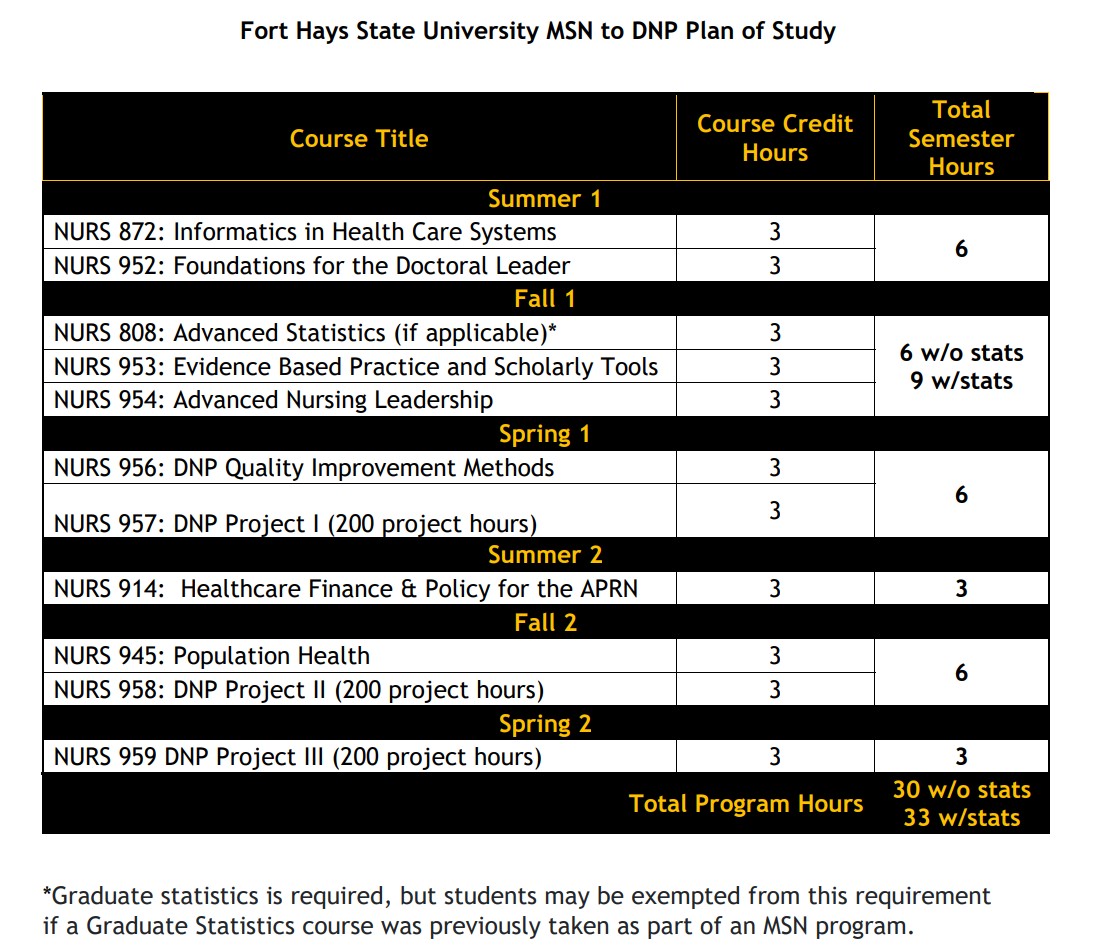MSN to DNP
Doctor of Nursing (DNP)
**Please note: The summer 2025 BSN-DNP and MSN-DNP cohorts are approaching capacity. We are currently reviewing complete applications and there will likely be a waitlist.
We do have the option for you to apply as a Nursing Graduate Non-degree student and then apply for the summer 2026 cohort. This option would allow you to take up to six credit hours prior to admission to the DNP program. The courses students may take are limited to NURS 808 Advanced Statistics and NURS 872 Informatics in Healthcare Systems. Registration in these courses is based on seat availability. See additional information below under ‘Optional Courses Prior to Admission.’ Completion of the courses as a non-degree student does not guarantee acceptance into the DNP program.
Please contact Dr. Michelle Van Der Wege (mlvanderwege@fhsu.edu) for questions prior to beginning your application.**
Fort Hays State University Department of Nursing offers a plan of study for those students who have graduated from an accredited school with a Master's of Science in Nursing degree in an Advanced Practice role as a Nurse Practitioner, Nurse Anesthetist, and Nurse Midwife.. The MSN-DNP Pathway is an online program requiring one day on campus.
Students seeking to register in the MSN-DNP Pathway will take a total of 30 credit hours. Graduate statistics is required and offered at FHSU if this requirement is needed. Students may be exempted from this requirement if a Graduate Statistics was previously taken as part of a MSN program. Project hours listed are the minimum for graduation in the MSN-DNP Pathway. Additional hours may be added dependent upon precepted hours at the master's level.
FHSU Department of Nursing MSN to DNP Plan of Study - 2 year plan:
MSN to DNP Plan of Study
Students progress through the MSN-DNP Pathway in cohorts. All cohorts begin in the summer. Please click the link below for additional information about the Plan of Study. The Plan of Study is the same for all students in a cohort and cannot be changed.
If you wish to take courses prior to the summer, we do have the option for you to apply as a Nursing Graduate Non-degree student and then apply for the next summer cohort. This option would allow you to take up to six credit hours prior to admission to the DNP program. The courses students may take are limited to NURS 808 Advanced Statistics and NURS 872 Informatics in Healthcare Systems. Registration in these courses is based on seat availability. See additional information below under 'Optional Courses Prior to Admission.' Completion of the courses does not guarantee acceptance into the DNP program. Please contact Dr. Michelle Van Der Wege (mlvanderwege@fhsu.edu) for questions prior to beginning your application.
Fort Hays State University MSN to DNP Plan of Study (for cohorts admitted Summer 2022 and after):

MSN to DNP Plan of Study (for cohorts admitted Summer 2022 and after)
Clinical Clearance
Students must complete all clinical clearance requirements the semester prior to beginning project courses. Vaccinations and/or titers may be required in order to be clinically cleared. Additional costs may be incurred, including but not limited to the clinical tracker, drug test, lab work and/or immunizations. Students will not be able to participate in clinical and/or project courses if clearance is not obtained. This may delay or prevent progression in courses and the program.
Clinical experiences in the MSN-DNP Pathway
There are no preceptored clinicals in the MSN to DNP Pathway. You will complete a project, but it is not a 1:1 preceptored experience. You work independently and with facility team members to implement a QI project—translating research to practice. A minimum of 600 hours (200 hours over 3 semesters) will be required for project.
On-campus requirements for MSN-DNP students
MSN to DNP students are only required to come to campus one time; this is to complete a formal presentation regarding their DNP project. The date also coincides with graduation. There are times throughout the program that students may be asked to do virtual synchronous activities, but this are communicated at the beginning of each semester so students can plan accordingly.
Benefits of the Doctor of Nursing Practice Program
Doctor of Nursing Practice Academic Programs
Applying to the Doctor of Nursing Practice Program
Admission Criteria
Tuition
DNP Project Information
DNP Program Outcomes
Contact Information
Accreditation
Handbook
The Doctor of Nursing Practice program at Fort Hays State University is accredited by the Commission on Collegiate Nursing Education, 655 K Street, NW, Suite 750, Washington, DC 20001, (202) 887-6791.
The RN to BSN program, MSN programs, and DNP program are all online. These programs do not meet the requirements for International students who require on campus courses.
Fort Hays State University Department of Nursing does not accept applications for the nursing program from the following states: Tennessee, Utah, Alabama, Washington